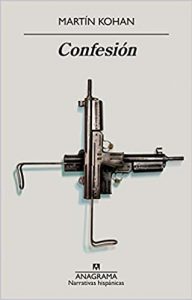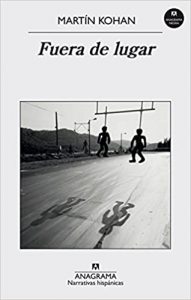Paradoxically, we usually find the freest and most dazzling literature in established writers who are not completely dedicated to writing. AND Martin Cohan he is one of these storytellers of our day. Because one can have the virtue or the gift to turn everything into a bestseller through that electrical impulse between mind and fingers on the keyboard, but the question is the most certain freedom of the will that drives everything ...
In other words, would your last novel have Stephen King unless you knew it would become a new bestseller right away? Although it seems it is not a criticism and welcome to each and every one of the new novels of Stephen King. However, I suspect that we are missing something better by the mere fact of succumbing to preconceived publication inertias to mark time and form for each new work.
Circumloquies aside, Kohan makes the most of that will subject only to the most powerful of the internal forum, to the atavistic, spiritual and instinctive need to tackle a new creation. To later devote himself to other tasks in his day to day. And so come works without temporal cadence but with that force of what is written to project a great idea, an intense concern, characters that show us their latent truth in their hands ...
Top 3 Recommended Novels by Martin Kohan
Confession
It is never a good time to face the confession that justifies all our actions, even less in such dark times of ideologies hungry for wills. It is not even a good time to do it before ourselves or of course in front of others. But confession always comes, waiting for the vomit of our truth.
Three stories that are part of the same story. In 1941, in a city in the Argentine provinces, a girl confided to a priest the first and diffuse sexual impulses that she noticed in her body, related to the attraction she felt for a young man named Videla who passed by her window every day. In 1977 a group of young revolutionaries prepared an attack on an airfield to kill a Videla who is no longer young and is known to all.
And finally, an old woman (the girl in the first story) plays a game of cards with her grandson, who has come to visit her at the residence where she spends her days, and between moves she tells her what happened to her. son, the boy's father, resulting in a new confession. Three stories and three times that are interwoven to forge a single story. Three stories that speak of pain, guilt and confessions.
An overwhelming and dazzling novel, built with a brilliant architecture that allows the author to penetrate to the core of the stories (of the story) that he tells us.
Out of place
No one more out of place than the stateless person or the exile from the only paradise of childhood. Nothing is more improper (this out of place is reiterated), than the migrant forced by a thousand vicissitudes that move us from the site, amid nostalgia increased by the idea of what could never have been because of the most wicked fate.
Out of place it takes place in diverse geographies: the foothills, the coast, the suburbs, the remote countries of the East, a border. And also on the Internet, the space of all spaces. Of course, the characters who move from one place to another, those who leave and venture out, are not going to be closer to the truth for that reason than those who always remain fixed in the same point.
And that's because the logic that is imposed in Out of Place is none other than that of the detour. The detour: either in the perversions of the photos with children that are narrated in the beginning, or in the trip astray that is narrated in the end. What is out of place in Out of place? In part it is the aberration: that which should not happen and, nevertheless, does happen. In part it is dislocation: the fatal way in which those who feel most confident of following the right clues are disoriented and lost.
And in part it is the way in which Martín Kohan arranges the police plot of this novel: there are acts and there are traces, there are facts and there are consequences; but the traces and the consequences always appear in a different place from the place where it would be supposed, where it would be expected, where it is going to be looked for.
Bahía Blanca
There is an obvious attraction in the many cities where good things are said about. But it cannot be remotely compared to the attraction of a city about which adverse things are always or almost always said. That is why Bahía Blanca, the gateway to Patagonia in the south of the province of Buenos Aires, is the heroine of this novel. Because a city so charged with negativity becomes an ideal place for someone who needs to forget, cancel, suppress, deny.
And that is what happens to Mario Novoa, the hero or antihero of this story. Because their love story has reached that terrible point where the desperate and the impassive come together and work at the same time. And when that happens, there is no other option but oblivion. The result is the best novel by an essential Argentine author.



